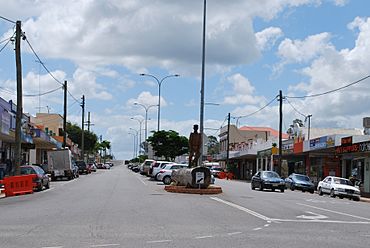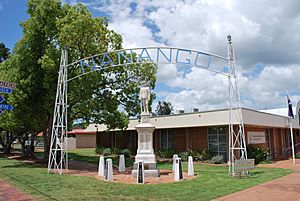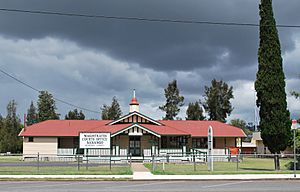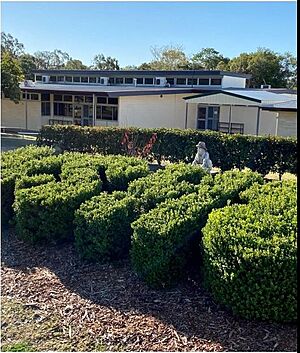Nanango facts for kids
Quick facts for kids NanangoQueensland |
|||||||||||||||
|---|---|---|---|---|---|---|---|---|---|---|---|---|---|---|---|

Drayton Street, the main street of Nanango, 2010
|
|||||||||||||||
| Population | 3,679 (2021 census) | ||||||||||||||
| • Density | 117.92/km2 (305.4/sq mi) | ||||||||||||||
| Postcode(s) | 4615 | ||||||||||||||
| Elevation | 355.0 m (1,165 ft) | ||||||||||||||
| Area | 31.2 km2 (12.0 sq mi) | ||||||||||||||
| Time zone | AEST (UTC+10:00) | ||||||||||||||
| Location | |||||||||||||||
| LGA(s) | South Burnett Region | ||||||||||||||
| State electorate(s) | Nanango | ||||||||||||||
| Federal Division(s) | Maranoa | ||||||||||||||
|
|||||||||||||||
|
|||||||||||||||
Nanango /nəˈnæŋɡoʊ/ is a rural town and locality in the South Burnett Region, Queensland, Australia. In the 2021 census, the locality of Nanango had a population of 3,679 people.
Contents
Geography
Nanango is situated 190 kilometres (118 mi) north-west of the state capital, Brisbane, at the junction of the D'Aguilar Highway and the Burnett Highway.
Sandy Creek (26°40′15″S 152°00′14″E / 26.670760°S 152.003907°E), which meanders through the town and locality, is part of the Burnett River catchment. The productive lands of the catchment feature sedimentary floodplains. The rich fertile soils of the floodplains are the agricultural and resource backbone of the region. While there are benefits from the flooding there are also risks, including the loss of vegetation in riparian zones, biosecurity problems and spread of weed species.
History
The original inhabitants of the area are the Aboriginal people belonging to the Wakka Wakka (or Waka Waka) people. The area was used as a gateway to bunya nut festivals, for which Aboriginal people would travel from as far away as the Clarence River in northern New South Wales and the Maranoa River to feast on bunya nuts from the bunya trees.
The name Nanango has evolved from the Wakka Wakka word "nunangi", but there is dispute over its meaning. The word was either the name of a significant gathering place, or means "large watering hole", or was ascribed to a local Aboriginal elder at the time of European settlement.
The first Europeans to settle in the area around Nanango were John Borthwick and William Oliver from Ipswich, who took up pastures for sheep grazing in 1847. The first commercial establishment at the site of Nanango township was Goode's Inn, founded by prospector Jacob Goode in July 1848. The inn served travellers journeying from Brisbane and Limestone (now known as Ipswich), and became the meeting place for early residents of Taromeo, Tarong and Nanango stations. The town of Nanango quickly developed around it. Goode's original rough slab structure met the licensing conditions because his first licence for the "Burnett Hotel situated at Barambah Creek" was given at a special licensing meeting on 26 April 1849.
Nanango claims to be the fourth-oldest town in Queensland, but such claims depend on how the age of the town is determined. In some cases, it is by the first settlement (usually for pastoral purposes in or near the relevant town), or it might be date of the first survey for a town plan. Nanango's claim to be fourth-oldest is based on the first establishment of commercial premises, which is Goode's Inn. On that basis, it is the fourth olderst, following Ipswich (then called Limestone), Drayton, and Maryborough. However, Nanango was not surveyed as a town site until 1861, and several other towns were surveyed before that.
Goode's Inn Post Office opened on 5 January 1852. It had been renamed Burnett Inn by 1855 and became Nanango on 1 July 1859.
Nanango State School opened on 1 January 1866. In January 1955, it was expanded to have a secondary school department, an arrangement that continued until Nanango State High School opened on 25 January 1982.
Beef, dairy and timber, in particular the valuable red cedar (Toona ciliata), were the primary early industries in the area. The discovery of gold at the Seven Mile Diggings near Nanango in 1867 precipitated a gold rush, and a local population boom, but the gold deposits were found to be meagre. At one time the population included 700 miners, many of whom were Chinese.
Land in Nanango was open for selection on 17 April 1877, and 48 square miles (124 km2) were made available.
A second population boom occurred when the Brisbane Valley railway line was extended to Yarraman in 1911. On 13 November 1911, Nanango railway station (26°40′24″S 152°00′08″E / 26.6733°S 152.0023°E) became the terminus of a branch off the South Burnett railway line at Kingaroy. A 22.5-kilometre (14.0 mi) missing rail link between Nanango and Yarraman, although planned, was never built.
St Patrick's Catholic Primary School was established by the Sisters of Mercy on 28 April 1912.
In February 1913, 1,222 acres (495 hectares) of Nanango Station, in areas of from 63 to 122 acres (25 to 49 hectares), were advertised to be auctioned by Jno Darley and W. Hamilton, on behalf of Mr Jas Millis. A map advertising the auction stated that the Estate was situated 3 to 5 miles (5 to 8 km) from Nanango where there is "an up to date butter factory and public offices". The land was described as mainly creek flats fronting Barker's Creek, rich alluvial and black soil suited to growing lucerne, potatoes, wheat, oats and maize. Some blocks also have access to Meandu Creek as a permanent source for water.
On 29 January 1920, the Nanango War Memorial was unveiled by Major-General Thomas William Glasgow.
A Baptist congregation was formed in Nanango in 1929 and was officially constituted in 1932. The Nanango Baptist Church officially opened at 81 Drayton Street (26°40′16″S 151°59′56″E / 26.6710°S 151.9990°E) on Saturday 29 February 1936. In 1998, the congregation needed a more spacious church and relocated to a new building at 37 Mount Stanley Road, under the new name of Nanango Community Baptist Church. The old church was sold into private ownership.
After World War I, however, growth levelled off until the early 1970s, when the development of the Tarong Power Station led to a third population explosion.
In April 1921, two subdivisions at Nanango and Tarong Estate and Township were advertised for auction by John Darley and Isles, Love and Co. The Tarong Estate, 12 miles (19 km) from Nanango and Tarong railway stations, offered 25 agricultural farms and 62 town allotments, while the Grange Estate, 11 miles (18 km) from Nanango and 18 miles (29 km) from Kingaroy, in the Parish of Booie, offered 15 dairy farms.
Nanango State High School opened on 25 January 1982, having previously been a secondary department attached to Nanango State School.
The Nanango Library opened in 1962.
Demographics
At the 2006 census, the town of Nanango had a population of 3,083. In the 2011 census, there was a population of 3,795. In the 2016 census, the population was 3,599 people., and in the 2021 census, Nanango had a population of 3,679.
Heritage listings
Nanango has a number of heritage-listed sites, including:
- Nanango Butter Factory Building, George Street
- Nanango Court House, 30 Henry Street
- Ringsfield House, a grand country residence and gardens. built by Robin Dods for Mrs Florence Graham in 1908, 41 Albert Street
Economy
Nanango's principal industries are coal mining and power generation, agriculture, beef and pork production, dairying and milk processing, timber growing and milling, small crops, natural medicine, art and craftwork and tourism.
Education
Nanango State School is a government primary (Early Childhood to Year 6) school for boys and girls, at 39 Drayton Street ( 26°40′18″S 152°00′20″E / 26.6716°S 152.0055°E). In 2018, the school had an enrolment of 438 students with 37 teachers (34 full-time equivalent) and 26 non-teaching staff (18 full-time equivalent). It includes a special education program.
St Patrick's Primary School is a Catholic primary (Prep–6) school for boys and girls, at 16 Alfred Street (26°40′21″S 151°59′49″E / 26.6725°S 151.9969°E). In 2018, the school had an enrolment of 77 students with 9 teachers (7 full-time equivalent) and 8 non-teaching staff (5 full-time equivalent).
Nanango State High School is a government secondary (7–12) school for boys and girls, at 54 Elk Street on over 35 acres (14 ha) of land (26°40′04″S 151°59′35″E / 26.6678°S 151.9930°E). In 2018, the school had an enrolment of 522 students with 52 teachers (49 full-time equivalent) and 37 non-teaching staff (28 full-time equivalent). It includes a special education program.
Facilities
Nanango Police Station is at 34 Henry Street (26°40′11″S 152°00′07″E / 26.6697°S 152.0019°E).
Nanango Fire Station is at 14 Alfred Street (26°40′21″S 151°59′55″E / 26.6726°S 151.9986°E).
Nanango SES Facility is at 29 Grey Street (26°39′53″S 151°59′51″E / 26.6646°S 151.9975°E).
Nanango Hospital is a public hospital at 135 Brisbane Street (26°39′59″S 152°00′30″E / 26.6663°S 152.0082°E). It has a heliport (26°39′57″S 152°00′27″E / 26.6659°S 152.0076°E).
Nanango Ambulance Station is at 95 Drayton Street (26°40′15″S 151°59′52″E / 26.6709°S 151.9978°E).
Nanango Cemetery is at 53 Applin Street West (26°40′31″S 151°59′30″E / 26.6752°S 151.9917°E).
Nanango Aerodrome is in Racecourse Road (26°41′23″S 151°59′16″E / 26.6896°S 151.9878°E).
Amenities
Nanango also has a vigorous cultural and sporting life and is host to several potteries, an art gallery and many craft outlets. The town also has many clubs and a range of sporting facilities, including RSL, cycling, darts, golf, lawn bowling and archery clubs. There are 13 well-maintained parklands in the Shire which naturalists believe are home to 250 different bird species.
Nanango Golf Club has a 18-hole golf course on Millis Way (26°39′58″S 151°58′54″E / 26.6661°S 151.9817°E).
The South Burnett Regional Council operates a library in Nanango at 48 Drayton Street (26°40′15″S 152°00′07″E / 26.6708°S 152.0020°E).
The Nanango branch of the Queensland Country Women's Association meets at its hall at 59 Fitzroy Street (26°40′09″S 152°00′00″E / 26.6693°S 151.9999°E).
The Nanango Baptist Community Church is at 37 Mount Stanley Road (26°40′08″S 152°00′32″E / 26.6690°S 152.0090°E).
Nanango Wesleyan Methodist Church is at 55 Cairns Street (26°40′08″S 151°59′37″E / 26.6688°S 151.9935°E). It is part of the Wesleyan Methodist Church of Australia.
There are a number of parks in the area:
- Green Park (26°40′08″S 151°59′29″E / 26.6689°S 151.9914°E)
- Lee Park (26°41′29″S 151°59′24″E / 26.6913°S 151.9899°E)
- Lions Park (26°40′47″S 151°59′48″E / 26.6796°S 151.9966°E)
- Pioneer Park (26°40′29″S 152°00′12″E / 26.6746°S 152.0033°E)
Attractions
Located approximately 200 kilometres (120 mi) from Brisbane, Nanango attracts day and weekend trippers from South East Queensland.
A great deal of Nanango's history is preserved in its buildings, especially Ringsfield House (26°40′22″S 151°59′37″E / 26.6727°S 151.9936°E), a restored circa 1908 Queenslander developed by architect Robin Dods.
Unfortunately, a number of fires have ravaged the central business district (CBD) of the town, especially one in 1940, which destroyed all of the shops on the southern side of Drayton Street, from Fitzroy to Henry Street. That has led the CBD having a "1950s feel" due its rebuilding in the style of the time.
Nanango serves as a gateway for exploration of nearby towns. Day trips from the town include the Grapes and Gourmets Drive, Bunya Mountains, Coomba Falls and fossicking at Seven Mile Diggings.
The Nanango Country Markets are held on the first Saturday of every month and are widely recognised as the largest rural markets in South-East Queensland.
Events
Nanango has a number of live entertainment venues which regularly host performances by local theatre and musical groups. The Lee Park race track, not far south of the CBD, hosts around eight meetings each year.
Major annual events include the international Criterium Bike Race, held in Nanango's CBD in February, the Nanango Show (held at the Nanango Showgrounds in April), the Nanango Medieval Fest, on the fourth Saturday in August, the Nanango Arts Fest, held over a week in October, the Nanango Country Music Muster, held at the Showgrounds in September, the week-long Mardi Gras in October, and the Christmas Carnival in December.
Climate
The area has a similar climate to nearby Kingaroy, but it is cooler in winter and generally more humid.
| Climate data for Nanango | |||||||||||||
|---|---|---|---|---|---|---|---|---|---|---|---|---|---|
| Month | Jan | Feb | Mar | Apr | May | Jun | Jul | Aug | Sep | Oct | Nov | Dec | Year |
| Record high °C (°F) | 40.0 (104.0) |
39.3 (102.7) |
37.4 (99.3) |
34.5 (94.1) |
32.0 (89.6) |
28.2 (82.8) |
26.5 (79.7) |
29.6 (85.3) |
35.0 (95.0) |
37.2 (99.0) |
39.9 (103.8) |
39.8 (103.6) |
40.0 (104.0) |
| Mean daily maximum °C (°F) | 30.4 (86.7) |
29.0 (84.2) |
27.9 (82.2) |
25.5 (77.9) |
22.2 (72.0) |
19.6 (67.3) |
19.3 (66.7) |
21.0 (69.8) |
23.8 (74.8) |
26.8 (80.2) |
29.1 (84.4) |
30.1 (86.2) |
25.4 (77.7) |
| Mean daily minimum °C (°F) | 17.3 (63.1) |
17.2 (63.0) |
15.4 (59.7) |
11.0 (51.8) |
6.9 (44.4) |
3.8 (38.8) |
2.7 (36.9) |
3.2 (37.8) |
6.5 (43.7) |
10.7 (51.3) |
14.0 (57.2) |
16.1 (61.0) |
10.4 (50.7) |
| Record low °C (°F) | 10.4 (50.7) |
8.1 (46.6) |
6.1 (43.0) |
2.8 (37.0) |
−3.5 (25.7) |
−4.5 (23.9) |
−6.7 (19.9) |
−5.7 (21.7) |
−2.5 (27.5) |
−0.3 (31.5) |
4.3 (39.7) |
5.7 (42.3) |
−6.7 (19.9) |
| Average rainfall mm (inches) | 112.5 (4.43) |
103.0 (4.06) |
82.2 (3.24) |
47.7 (1.88) |
43.6 (1.72) |
42.1 (1.66) |
40.9 (1.61) |
32.6 (1.28) |
39.5 (1.56) |
65.4 (2.57) |
76.0 (2.99) |
104.5 (4.11) |
790 (31.11) |
| Average rainy days (≥ 0.2mm) | 9.9 | 9.6 | 9.2 | 6.8 | 6.6 | 5.7 | 5.2 | 4.7 | 5.1 | 6.7 | 7.9 | 9.0 | 86.4 |
| Source: Bureau of Meteorology | |||||||||||||
Notable residents
- Darcy Ward, an Australian former motorcycle speedway rider





